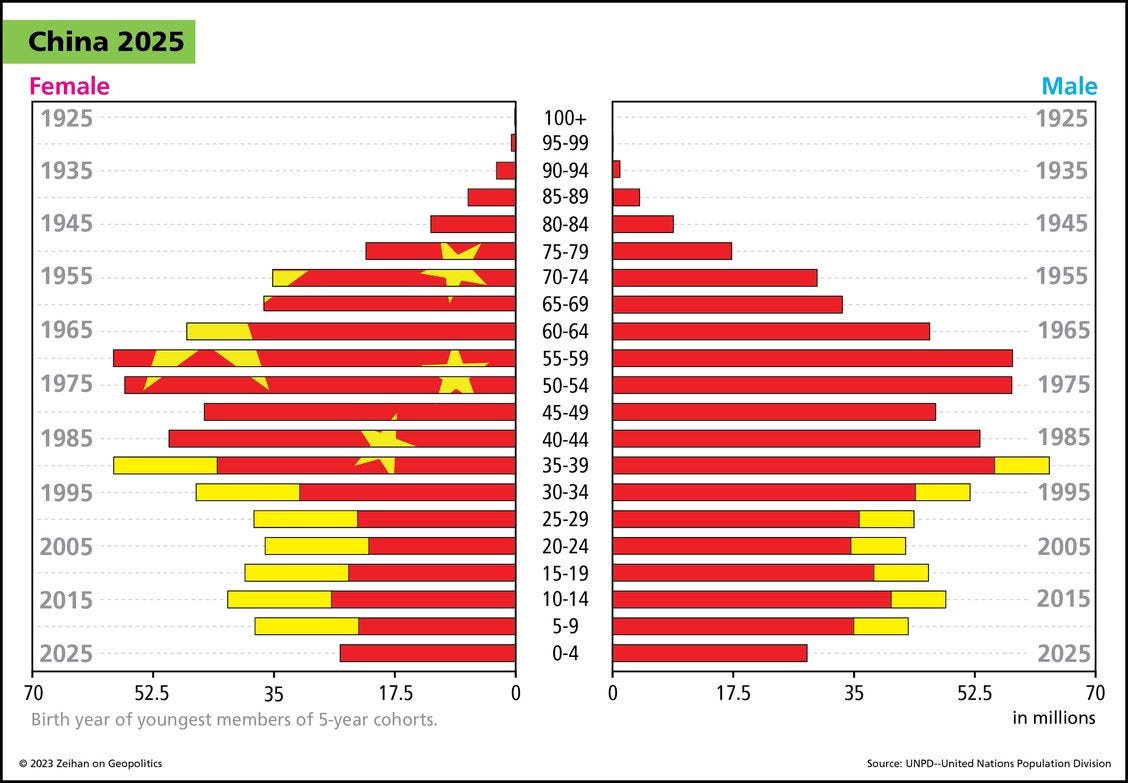Four For Friday | July 14, 2023
LF63 | Mariana's new index, China's collapse, dementia villages and the need for green space
Welcome to a Looking Forward’s Four For Friday. Four things that have piqued my interest this week. Enjoy!
An index to show how well cities solve problems
Regular readers of this newsletter know I’m a big fan of Mariana Mazzucato as well as of indices as tools for change. So I’m delighted to report a new initiative involving both.
Mariana (I feel we’re on first name terms by this stage) has done a wonderful job in changing mindsets around the purpose and role of governments - taking down the myth that innovation only comes from private sector innovators. She’s now collaborating with Bloomberg’s city supremo James Anderson to create a new index that looks at how well cities are addressing the big challenges of our age:
While there are many city indexes that rate everything from livability to investability, none has benchmarked cities on their capacity to solve critical challenges. What do the data say about local governments’ capacity to improve lives? Are governments in California better prepared to tackle climate change than those in Texas? Are cities in Spain more or less equipped to innovate through the next pandemic compared to cities in other OECD countries? What critical skills, processes, and structures will a given municipality need in order to detect emergent issues and fashion appropriate responses?
This will take us into some really interesting areas: how do different cities define and measure problems?, for a start. Also, there will be a temptation to take something that works in place A and apply it in place B, and yet it may be the unique culture of that city that made the solution work (am thinking of ‘high trust’ places where the community is likely more effective than low trust places).
This promises to be an open toolkit, and I very much look forward to seeing this emerge. I hope they sync with the folks at City Longevity (see LF61) who are building something similar focused on longevity.
China’s demographic collapse
A remarkable if true assessment of China’s demographic collapse by Peter Zeihan, an opinionated (but more often right than wrong), globally-minded geographer who predicted Russia’s invasion a decade ago and has long been bearish on China, due to demographic reasons in particular.
He cites new official data out of China showing a marked decrease in young people, and suggests it’s even more extreme - editing the official projections with his team’s assessment.

This has implications such as a 15x increase in labour costs this century (the steepest rise in labour costs in all of history, including the Black Death) and according to him the imminent demise of China as a modern industrial nation. Seems likely that this population crisis may play into the country’s security strategy. Would be good to hear the counterpoint on this.
Dementia villages - almost perfect?
Good to see the New York Times shining a light on dementia villages, and hear of a number of new examples, including in US and Australia. On the face of it dementia villages seem like a remarkably effective, efficient and compassionate approach, but in conversation recently with a senior housing developer (so biases noted), he said he felt they could be artificial and patronising, and ‘real’ cities are better than fakes ones. It seems the lines are already blurring and will continue to do so.
In general, it feels that we should be thinking about combining the physical infrastructure elements of dementia villages with some of the more holistic, tech-enabling innovations happening around payment models such as with PACE.
Healthcare isn’t the key to a healthy population
Good to see Wired discussing public health, and making the case (this for the UK, but applies to any country) that good health outcomes are based on a lifetime of healthy environments, not just clinical care, which is generally far too late to change the course of health.
In the UK, public health spending fell 15% in the six years before the pandemic and it would be interesting to know if that tide has since turned. But even population health is still too narrow. Food, exercise, sleep, pollution, community, meaning - these are the keys. But it’s hard to live healthily if the context doesn’t support it; calories from healthy food costs 3x more than from unhealthy food, for example.
Regarding exercise and outdoor activity, the UK government found that access to green space for everyone would save billions of pounds in health costs, but the bad news for those living in deprived areas is that they have 9x less of them than wealthy areas.
This is what good government could do well. It’s an opportunity for forward-thinkers - not just about fixing short term market failures but shaping societies and making the long term investments that don’t happen otherwise. How to ensure that such long-term thinking doesn’t get sacrificed in favor of handouts to special interests is one of the defining challenges facing us.
That’s all for this week. As always, feedback welcome. Feel free to share insights or links of interest.
- Stephen


